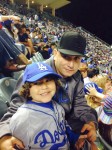Jose Ortega often refused to accept his biweekly paycheck at the UCLA Community Programs Office because he thought it could be used to supply more food to the CPO Food Closet instead.
“He was a hero to a lot of people,” said Emilio Hernandez, a community service advisor at CPO.
Ortega, a fourth-year history student, died May 1 from a heart attack. He was 47.
His brother, Daniel Ortega, said Ortega inspired him to get straight-A’s as a kid and later motivated him to get his doctoral degree.
“We used to have races as little kids but he was always faster,” Daniel Ortega said. “He set the bar for me.”
Jose Ortega was the oldest of four children in a single-parent family living in South Gate, California. His interest in graffiti art got him involved with gang members who recruited him to make their own graffiti, Daniel Ortega said. He was in and out of prison for several years and was released for the last time in 2009, he added.
“It was a tough place to be at,” Daniel Ortega said. “But he never stopped being my role model.”
After being released from prison, Jose Ortega decided to go to school after a conversation with his brothers, Daniel Ortega said.
“He wanted to do better for his nieces and nephew,” Daniel Ortega said. “He got tired of that life.”
In 2009, Jose Ortega went to a community college and got involved in the PUENTE Program, an academic and mentorship program that helps students transfer into four-year universities, Hernandez said.
When Ortega transferred to UCLA in 2015, he initially got involved in CPO by using services such as the food closet, which provides free food, and the CPO Men’s Collective, which conducts group activities and outings, Hernandez said. At one of the CPO Men’s Collective meetings, Ortega showed the group members how to make a spread from a recipe he created in prison, using ramen noodles, hot pickles, pork cracklings and cheese in a can.
“He appeared nervous at first while speaking in front of the group, but his humor and charisma soon captivated all of us,” Hernandez said.
Last year, CPO made him an employee as part of the CPO Leadership Externship program for formerly incarcerated students, Hernandez said. Through the program, Ortega motivated formerly incarcerated youth at Los Angeles Southwest College by sharing his own experiences at prison.
Hernandez has known Ortega for the past two years, he said. He added he thinks Ortega initially felt isolated on campus because he felt other students judged and stereotyped him for being a nontraditional transfer student.
“At first, he would never sit down in my office and would always stand by the door,” Hernandez said.
However, Hernandez said he thinks Ortega soon came out of his shell and made friends with everyone around him.
“He would walk up to strangers and start talking to them, sharing stories and jokes,” Hernandez said.
Isai Madrid, a UCLA alumnus who was Ortega’s friend for the past three years, said he thinks Ortega was generous and treated his friends as family. Once, Madrid wanted to go to the store to get eggs, but Ortega insisted on giving him his own from the fridge in the Student Activities Center lounge.
Madrid said Ortega always pushed him to do better in school, never letting him give up.
“(Ortega) had a sixth sense,” Madrid said. “He knew I was smart but I didn’t see it.”
Madrid added he thinks Ortega’s biggest passion was inspiring others, especially incarcerated youth, so they would not repeat his mistakes.
Ortega’s family said they would like him to get a posthumous degree for his dedication to UCLA.
“They don’t make them like Jose anymore,” Daniel Ortega said.

Thank you for always putting a smile on my face and chopping it up with me about baseball. You’re missed.